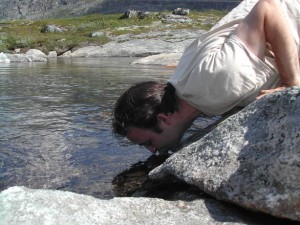My Water Tastes and Smells Good, But is it Really Ok?
Most of us recognize the importance of drinking enough water each day, but the reports in the media about pollution have some people worrying about whether their water is REALLY safe. Unfortunately, the taste and smell of drinking water does not necessarily mean that it is in fact safe. It is not uncommon for drinking water supplies to be contaminated with twenty to thirty chemicals. These pollutants can be traced to a number of sources, including factory discharges, urban runoff, agriculture, fracking, wastewater treatment facilities and even consumer products. In fact, research has suggested that 80% of hazardous waste sites have contaminated the groundwater supplies nearby. Since the drinking water for over 50% of U.S residents is sourced from groundwater supplies, this problem could impact a great many households. 
How Groundwater is Contaminated:
Groundwater is made up of the pockets of water which form under the surface of the earth between rock formations. Since this water travels through rock and soil, it can easily pick up natural contaminants such as minerals. Unfortunately, the groundwater can also be contaminated by human activities. Chemicals produced in the agricultural industry, mining, and other industries can leach into the soil and compromise the groundwater. This runoff is especially problematic after a heavy rainfall.
The Hidden Danger of Contaminants:
A sulfurous smell is a good indicator of hydrogen sulfide contamination. A metallic taste may indicate excessive levels of iron or copper. Unfortunately, the problem is that with water contaminants we cannot always rely on our natural senses of taste and smell. There are hundreds of different contaminants which do not have ANY affect on either. In fact they do not even impact the appearance of the water. These contaminants could pose serious health risks including reproductive problems, gastrointestinal illness, neurological disorders and increased risk of developing cancer. Contamination could also impair bodily functions and cause damage to the kidneys and liver. The elderly, young children, infants and pregnant women could be particularly vulnerable, additionally, people with a compromised immune system, such as those undergoing chemotherapy treatment or taking transplant medications, could be particularly susceptible to the effects of contaminated water.
Common Contaminants:
According to data from the CDC, the top ten causes of outbreaks within the public water system are attributed to Giardia, Legionella, Norovirus, Shigella, Campylobacter, Copper, Salmonella, Hepatitis A, Cryptosporidium and E.Coli. Most of these contaminants are bacteriological or viral in nature and have no impact on the taste, smell or appearance of the water. Other common contaminants include aluminum, arsenic, cadmium, chromium, fluoride, iron, nitrate, lead and selenium. Many of these contaminants are associated with some serious health complications.
The good news is that there are some simple measures which can be taken to protect you and your family. There are some domestic water treatment solutions, such as Reverse Osmosis or whole house systems that can not only remove water hardness particles, but can filter out almost 100% of all contaminants and neutralize bacteria. This ensures that your water not only tastes and smells good, but is safe for the whole family to consume. It’s important however to remember that water testing is the only reliable way to determine if your water supply is contaminated, so potential problems can remain undetected for long periods. If you are concerned that your water supply may be affected, it is well worth speaking to a reputable and experienced water treatment expert in your area for further advice.
About The Author:
Greg Scott is President of Valparaiso based Miracle/EcoWater Systems, the premier water conditioning company in Northwest Indiana serving the Lake, Porter and LaPorte County areas. A 3rd generation water treatment professional, Greg grew up in the family owned business started by his grandfather in the late fifties. He has made water treatment his life and under his direction and high-standards, the company’s water treatment experience, knowledge, and products are unrivaled in region.
Back to
